Throughout its first season I’m a Virgo tackles some titanic issues: Wrestling with the nature of identity, social perceptions and how media influences them, capitalist exploitation, and the overall existential crises inherent in existence, just to name a few. The undercurrent throughout all these topics being a search for genuine human connection. Yet, it cleverly does so with an absurd surrealist stylization that allows for visually visceral displays of emotion. Even when it risks alienating viewers, the series is never afraid to display challenging notions as it asks audiences to think critically about the world around them.
Spoiler warnings for Season 1 of I’m a Virgo.
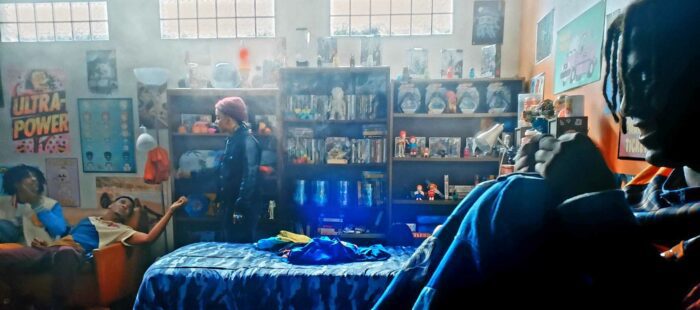
The series centers on Cootie, a 13-foot-tall giant. His parents, LaFrancine and Martisse, have been keeping him hidden for fear the world will react hostilely to a literal colossus. The show follows Cootie as he emerges into the wider world, growing from urban legend to media sensation, then his futile attempts at activism.
While I’m a Virgo seems primed to follow a formulaic comic book route, showrunner Boots Riley cleverly steers such conventions into criticisms. It’s a welcome breath of fresh air given growing superhero fatigue. The show critiques the way such figures are all theatricality, which at worst perpetuates a corrupt system, or at best involves ineffectual acts without much real social benefit.
For instance, at one point Cootie believes he can be a hero, or as the media will insist, the villain, by saving the Oakland area from rolling blackouts. These shutdowns are seen throughout the season, often occurring without warning. Cootie aims to smash a regulator which is periodically turning off the electricity, and in essence literally give power back to the people.
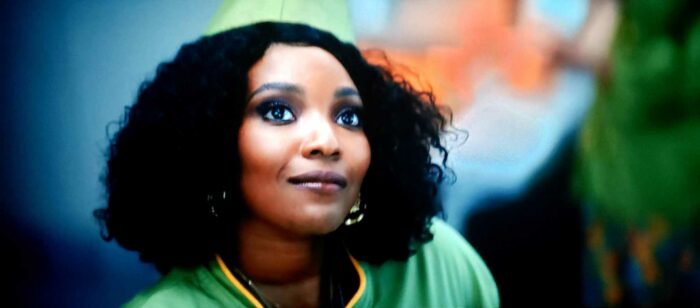
Granted, this act of sabotage isn’t shown. One could argue that’s a cost-saving measure for the show. However, I would put forward I’m a Virgo avoids glamorizing useless action.
Although Cootie’s fists destroy the equipment, victory is short lived. The regulator is quickly replaced, and blackouts almost immediately resume. The problem being that Cootie and his compatriots attacked a mere cog in the machinery. Already prepared for such interruptions, the mechanisms oppressing people barely miss a beat.
This act, however, brings Cootie into direct conflict with the antagonistic Hero, also known as Jay Whittle. He’s a tech mogul and comic book creator who ventured into the realm of vigilantism. He’s basically Iron Man if Tony Stark got his fashion sense from a cockateel. The costume design for the character being somehow simultaneously spot on for a comic book hero, while subtly highlighting the ridiculousness of such outfits in real life. There’s a wonderful scene where Whittle complains about a malfunctioning device that isn’t keeping his hair photogenic when he takes off his helmet—it’s all about maintaining an image.
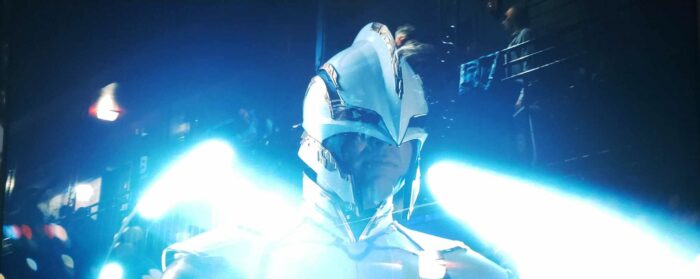
In any event, Jay and Cootie initially get into the typical final brawl until Cootie has a realization. To paraphrase a wise fellow from a film, he doesn’t risk the battle for Oakland’s soul in a fist fight. Instead, Cootie smartly passes the struggle off to his friend Jones. Primarily using words in conjunction with powers of her own, she manages to upend the Hero by shifting his perception. Ideas defeat Whittle more than a beating ever could.
Now, it’s important to start with the comic book associations in I’m a Virgo because they provide a narrative thread connecting a lot of the larger points. Since Episode 1, comics give Cootie a way to relate to the world. His sense of morality is inspired by costumed do-gooders, especially the Hero. However, this branches off into several avenues.
There’s the clear issue of media representation. Most of how Cootie explores the world involves what he sees on television, through internet videos, and comic books. The importance of this being later emphasized during Episode 6, “It Requires Trust on my Part.” Here we get to see Jay Whittle during a production meeting for the Hero comic, and he outright states that all art is propaganda. Every form of expression shares an idea which either shapes or shifts perceptions. Knowing this, Whittle is intentionally trying to manipulate the world into sharing his points of view on justice, social structure, etc.
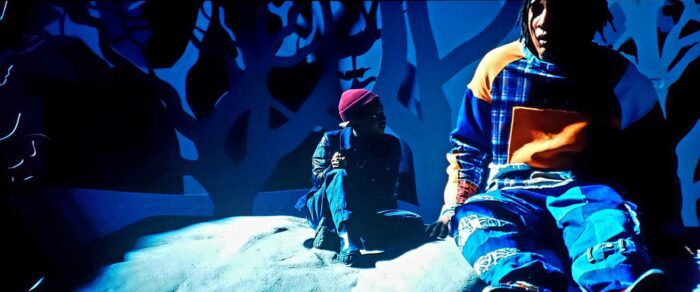
As such I’m a Virgo calls into question every display of heroics. Mainly the way in which they’re represented by the news and entertainment industry which seek to influence prevailing attitudes. Case in point, activists protesting hospital policies that turned away an injured young man, leaving him to bleed to death at a bus stop, are portrayed by the news as a dangerous mob Whittle valiantly opposes. His main accomplishment sucker punching Cootie then dragging the giant in chains through the street.
The subsequent episode shows Cootie under house arrest receiving the latest issue of the Hero comic in the mail. Something he’s loved since childhood. Hoping for a sliver of joy while miserable, he instead finds a cover featuring a characterization of him as a supervillain.
It’s a devastating moment, especially since Cootie has long ignored the dog whistles others have warned him about in this form of media. The sad truth being he’s forged an intentional cognitive disassociation between implications, racist and otherwise, in the Hero comics and what he believes is the intended morality. In other words, he’s separated the fictional character from the reality despite the two being one and the same.
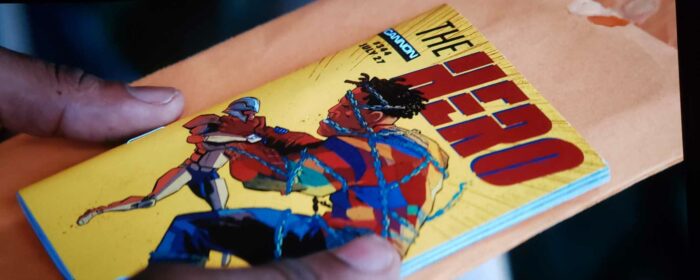
This clash between idealism and reality is a constant element of I’m a Virgo. What people perceive as the truth, or the right course of action, is often in conflict with the way things play out. Consequently, characters like LaFrancine and Jones, who are aimed towards similar goals, have very different ideas on how to achieve success. Jones believes in organizing the people into collective action, empowering every individual to take part in pulling down the system. Meanwhile, LaFrancine believes in proactive leaders taking charge. Where they lead the rest are sure to follow, especially if it means greener pastures. Values the two try to get Cootie invested in.
On that note, the comic book thread throughout I’m a Virgo weaves in the issue of powers. Cootie isn’t the only person with special abilities. His love interest Flora can move at incredible speed. Plus, Jones possesses the ability to pull people into a kind of psychic theater.
Both are interesting in their own respects. The ability displayed by Jones allows for the celebration of individuals who can use words to paint clear impressions of complex ideas. It also gives I’m a Virgo a surreal setting to elaborate on intricate notions such as crisis theory, dark truths about capitalism, and immiseration thesis. Flora’s speed not only makes her capable of being a classic comic book hero, such as when she flings tear gas cannisters back at the police before they can affect protesters, but it gets into some real human elements found throughout I’m a Virgo.
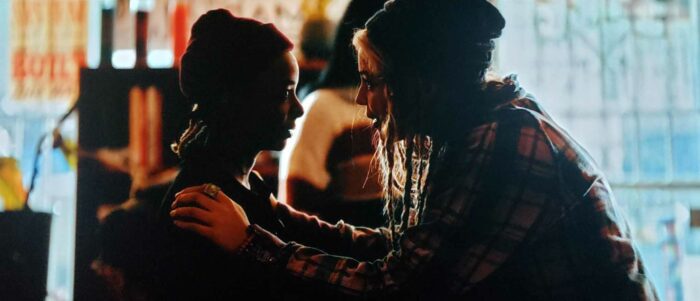
As a child, before her powers are understood, Flora is initially treated as autistic. This misunderstanding results in her growing up isolated for years. When she finally figures out on her own that she’s simply out of sync with the rest of the world, being able to communicate at last isn’t necessarily a gift. Conversations others have in minutes feel for Flora like hours dragging by. She’s lightning forced to associate with molasses, but in Cootie she finds a kindred spirit. Someone who may understand the isolation their uniqueness has inflicted on them.
What makes them special isn’t recognized by the world. In a way, that’s a feeling shared by other characters as well. Martisse is not only a father to Cootie, but at one time he used to be an aspiring musician. During a rare date night with LaFrancine, he’s recognized at a bar. One of his old music videos is soon played, and although its quality is debatable, I’m a Virgo uses him to establish the sacrifices people make throughout their lives. Many of which aren’t choices so much as accepting the road we’re forced to follow.
Such quiet lives of desperation abound and are made painfully clear by a secret episode of an animated show called Parking Tickets. Put together by David Lauer and Ri Crawford, the strange series is jarringly absurd. Characters voiced by Danny Glover, Juliette Lewis, and philosopher Slavoj Žižek expound on weighty existential notions, typically those dealing with love and human connection, before being interrupted by ludicrous dialogue. This usually comes from a character whose only line appears to be “Boyoyoyoyoing!”
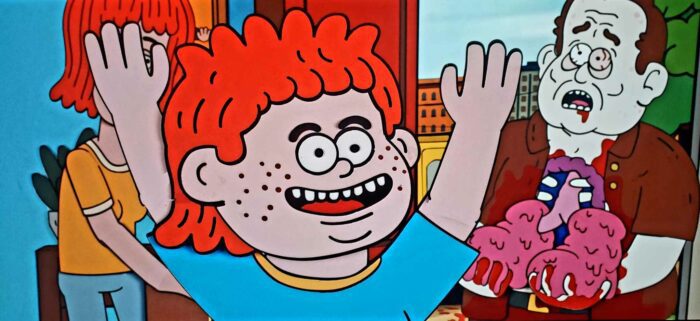
I say appears because there is a secret lost episode of Parking Tickets. Those who watch it slip into catatonic states of existential crisis. I’m a Virgo actually shows the episode, and I believe it’s strongly implied that nonsensical “Boyoyoyoyoing!” is a stand-in for all the trite things people spend their lives saying. Many of which in youth we think are brilliant, luminous, entertaining, and enlightening, but are really the same pointless gibberish spouted by people ad nauseum until death brings silence.
Yet, Parking Tickets is more than a mirthful odd aside. It’s a chance to show how committed people are to various types of media. The ways in which things like TV shows become modes of self-expression, manifestations of cultural identity, and connectivity. For instance, the character Scat bonds with Cootie over their shared love of the series, and Scat’s tragic death, bleeding to death at the bus stop, harkens back to an episode of Parking Tickets in a poetic visual involving snow.
I’m a Virgo blends all this into a surreal world about people isolated in their own uniqueness, which is often rejected rather than seen as special, due to social perceptions shaped by media propaganda in service to a system. That system being capitalism. No doubt the real villain of the series.
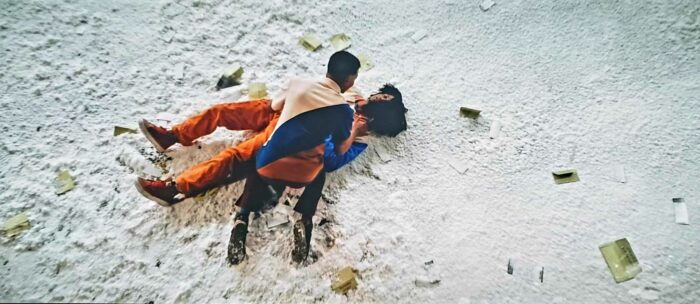
Exploitation and oppression constantly come back to money. The most insidious aspects of which revolve around how casually everyone accepts cash as a necessity. It is the system in which they live, so characters don’t typically picture any reality without it. When Cootie wants to continue his fledgling romance with Flora, he gets a job as a fashion model which is humiliating at best and racially insensitive at worst. However, he is told and believes he needs money to date someone. He can’t have love without coin.
Those facing eviction mysteriously turn into little people barely seven inches tall and are easily ignored. Gentrification guts the community, but too many in I’m a Virgo tend to sadly shrug their shoulders, relenting to the economic mechanism grinding them down; as if it is all that is, ever was, and will be, world without end, amen. The medical industry is darkly indicted for its unwillingness to help even the dying uninsured. And all of this, however surreal, comes from real life ills stemming from capitalism.
Mad cults looking for messiahs inspired by Greek mythology. The evils of capitalism and the war of ideas. What makes a person a hero, and how the media can tear a towering figure down in one round of the evening news. The existential nightmare that all lives are the same, without meaning, and destined only for death. I’m a Virgo touches on it all throughout its seven-episode run.
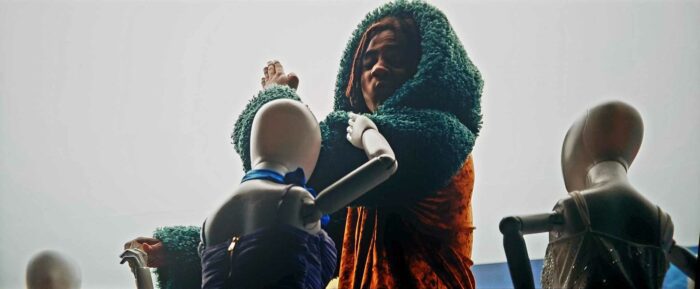
It can be rocky at times. Some parts do feel slower than others. However, a quality cast keeps the show steady.
Jharrel Jerome does a great job of remaining sweetly naïve throughout. Mike Epps and Carmen Ejogo are pitch perfect parents, understandably frustrated by the burden of raising a unique child, but still loving and optimistic about his potential. Walton Goggins is excellent as the cringeworthy Jay Whittle, a creep who can seem sympathetic for a second until he keeps talking. Olivia Washington as Flora conveys a sweet, inviting person who isn’t afraid to stand up for herself.
Complicated and challenging, I’m a Virgo asks a lot of its audience. Yet, it’s worth a watch. If nothing else, there’s little like it out there.

